Tech
Definition, Explanation, Pros & Cons
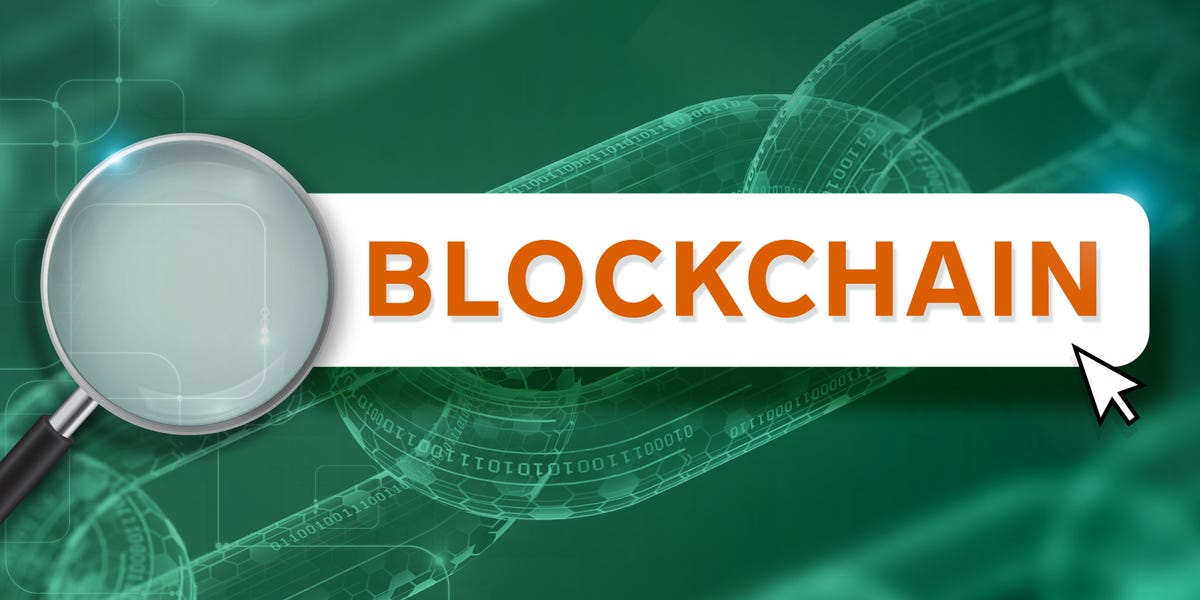
Paid non-client promotion: Affiliate links for the products on this page are from partners that compensate us (see our advertiser disclosure with our list of partners for more details). However, our opinions are our own. See how we rate investing products to write unbiased product reviews.
- Blockchain is a decentralized, digital database that stores transactions and other forms of data.
- Key blockchain features include immutable records, distributed ledger security, and smart contracts.
- Blockchain has many other uses outside of cryptocurrencies.
It’s almost impossible to say “cryptocurrency” without mentioning blockchain technology. A blockchain is a digital, public ledger that securely stores segments of data through a self-managing, peer-to-peer (P2P) network of computers. And some of its key components include irreversible records (i.e., unchangeable blocks of data), decentralized transactions, and smart contracts.
Decentralized digital assets like crypto and stablecoins use blockchain technology for buying and selling assets. Centralized banking digital currencies (CBDCs) are centralized currencies and don’t use a blockchain.
Here’s how blockchains work — along with a closer look at their pros, cons, and potential applications.
Blockchain key terms:
- Nodes: Strong computers connected to a blockchain network in order to process, maintain, and verify crypto transactions. Nodes rely on consensus algorithms and need to be connected to an open-source operating system. Types of blockchain nodes include mining nodes, full blockchain nodes, master nodes, and light nodes. For example, bitcoin uses light nodes to save storage space that only downloads key data.
- Decentralized currency: Currencies, such as cryptocurrencies and stablecoins, that are not issued by a government or financial institution in order to cut out banks as the “middlemen” of trading. Instead, decentralized currencies use peer-to-peer trading and a general system of trust.
- Digital currency: Also referred to as electronic money or digital money, is a form of currency without a physical equivalent and can only be accessed digitally. Examples of digital currencies includes cryptocurrencies, stablecoins, and central bank digital currencies (CBDCs).
- Peer-to-peer networks: Transactions are completed directly between merchants and consumers. It eliminates the need for bank loans or money borrowing. Some prominent examples of P2P networks include file-sharing (sites that allow users to share and download content), media streaming (such as YouTube, which allows users to upload content for viewers to access), and crypto trading platforms.
What is a blockchain?
A blockchain is a digital database that stores “blocks” of data in chronological order. These blocks are linked together on what’s known as the “chain,” and unlike traditional databases that utilize a third party or intermediary, a blockchain is completely decentralized.
This means that no third parties can monitor or interfere with transactions. The blockchain system is basically self-regulating, thanks to a P2P computer network of nodes (i.e., individual computers) that verify all new data and distribute cross-network copies of the blockchain to keep it secure.
“Blockchains are made of, well, blocks,” explains Lorien Gabel, co-founder and CEO of Figment.io. “Each block contains a timestamp, transaction data, and a mathematical function from the previous block. Computers that mine blocks or run validating nodes that sign blocks will include that mathematical function — called a cryptographic hash — from the previous block into the current block to form a chain.”
Quick tip: Blockchain is not to be confused with bitcoin. Bitcoin transactions wouldn’t be possible without blockchain technology, but the two are completely different. While bitcoin is a tradeable digital currency, blockchain is merely the underlying technology that makes secure transactions possible for bitcoin (and other digital assets).
Wealthfront Investing

Icon of check mark inside a promo stamp
It indicates a confirmed selection.
Perks
Account Minimum
$1 ($500 for automated investing)
Fees
$0 for stock trades. 0.25% for automated investing (0.06% to 0.13% for fund fees)
Pros
-
Check mark icon
A check mark. It indicates a confirmation of your intended interaction.Low annual fee for investment accounts; crypto trust investments available
-
Check mark icon
A check mark. It indicates a confirmation of your intended interaction.Tax-loss harvesting, portfolio lines of credit, 529 college savings plans available
-
Check mark icon
A check mark. It indicates a confirmation of your intended interaction.Cash account
-
Check mark icon
A check mark. It indicates a confirmation of your intended interaction.Mobile app and investing and retirement tools
Cons
-
con icon
Two crossed lines that form an ‘X’.You need at least $100,000 to utilize additional investment strategies
-
con icon
Two crossed lines that form an ‘X’.No human advisor access
Product Details
- Consider it if: You’re balancing several goals and want to streamline your finances.
- Promotion: Fund your first taxable investment account with at least $500 in the first 30 days of account opening and earn a $50 bonus.
How a blockchain works
Cryptocurrencies would essentially be nonexistent without a blockchain. This technology relies on a distributed ledger that keeps a record of all past, present, and future data (e.g., transactions or accounts).
“A blockchain is commonly used to build a distributed ledger,” says Gabel. Ledgers, he added, track accounting transactions and accounts — we can think of it as a database that stores information. “Distributed ledgers don’t have to be on a blockchain to be considered ‘distributed,’ they just have to be shared with other computers on the network.”
But several other features separate blockchain technology from traditional databases controlled by financial institutions. These include immutable, or unchanging, records and smart contracts.
Irreversible transactions
Each transaction that the nodes add to the blockchain is permanent. So once the computer network verifies the data and adds it as a new block, that record is permanent. And this serves much more important purposes beyond simply keeping the system running.
“Transactions are irreversible, permanently recorded, and available for everyone to see. It’s challenging and complicated for any one actor to change or falsify data recorded on a ledger,” explains Gabel.
In order to change the data on the ledger and have the modified chain become the majority chain, someone would have to both alter their duplicate of the ledger while adjusting at least 51% of other users’ copies of the database. Therefore, the immutable records component makes it extremely difficult to hack the system.
Smart contracts
“[A smart contract] is a self-executing contract with the terms of the agreement directly written into lines of code on the blockchain,” Gabel explains. This allows them to execute once the terms are met.
But as for the blockchain process, here’s how it works: Whenever a new transaction takes place (e.g., a bitcoin or ether buy order), that data is sent to a network of computers (nodes) that solve math equations to validate the transaction.
If the transaction is rejected, it won’t show up on the blockchain. But if it’s confirmed, the nodes will add the data as a new block on the ledger, chaining it to the prior blocks (and the ones that follow) to maintain the chain’s security. Once this step is done the transaction is complete.
The blockchain process can be broken down into simple steps.
Alyssa Powell/Insider
What is a blockchain used for?
Cryptocurrency is likely the first thought many people have when it comes to blockchain, but this technology has many other uses:
- Banking and finance: Blockchain has many uses for money transfers, especially for fiat currencies (e.g., USD, EUR, or JPY) that individuals typically exchange through financial institutions like banks or payment services.
- Cryptocurrency: This is perhaps one of the most well-known uses of blockchain technology. The blockchain stores data for all cryptocurrency exchanges.
- Healthcare: Blockchain has several applications within the medical industry. It can be used to secure medical records, healthcare data, and other related electronic records.
- Records of property: Whether it be property deeds or other assets, this technology can additionally validate property transactions between two parties.
- Voting: Though not currently in effect, the idea of using blockchain to improve the voting process has become a topic of discussion. Arguments in favor urge that it could prevent voter fraud and offer a simpler way of counting votes. Those against it insist that such a system could pose national security concerns.
Quick tip: Since blockchain isn’t a digital currency, you can’t directly invest in it. But you can still gain portfolio exposure by investing in the stocks of blockchain companies or platforms that offer cryptocurrency products.
“Blockchain technology provides a solution to the challenges of storing, managing, and protecting data,” says Gabel. “It provides a useful and secure way of authenticating information, identities, transactions, and more, creating a secure ledger that can be updated in real time.”
Blockchain: Pros and cons
Blockchain has several uses, including cryptocurrency transactions, fiat transfers, and more. However, there are also pros and cons to consider.
There are many perks to blockchain-secured transactions. Its efficiency, security, and lack of intermediaries can make it an ideal option for those looking to safely store a range of data.
However, since there’s no centralized party to govern the database, you can never recover any assets if you lose your private key. This is important to keep in mind if you’d like to take advantage of blockchain-powered transactions.
Insider’s Featured Crypto Apps
Chevron icon
It indicates an expandable section or menu, or sometimes previous / next navigation options.
Chevron icon
It indicates an expandable section or menu, or sometimes previous / next navigation options.
Editor’s Rating
4.14/5
A five pointed star
A five pointed star
A five pointed star
A five pointed star
A five pointed star
Editor’s Rating
4.34/5
A five pointed star
A five pointed star
A five pointed star
A five pointed star
A five pointed star
Building a blockchain
You can create your own blockchain (or build onto/modify an existing blockchain) if you have coding and/or advanced computer knowledge. By building your own blockchain, you can design your own cryptocurrency for others to trade. You’ll be able to choose its purpose, tokenomics, functionality, and legality.
You create a blockchain by:
- Designing your own by scratch: If you’re especially skilled at coding and computers, you may be able to create your blockchain from scratch. You’ll need to establish a secure network, create a functioning algorithm, choose a protocol, follow legal regulations, and make sure your code has strong defenses against hacks and other fraudulent activity.
- Modifying an existing blockchain: A slighter simpler (not necessarily easier) method of creating a blockchain is by modifying an existing chain’s open-sourced code and revising it to your liking. This way you can expand upon already functioning algorithms and possibly even improve functionality.
- Building onto an existing blockchain: This method isn’t necessarily “creating” a blockchain, but instead allows you to design your own cryptocurrency on top of an already existing blockchain, like Ethereum or Binance. It’s easier than the other two methods but also more restrictive.
Creating your own blockchain isn’t recommended for beginner crypto traders or beginner coders. Creating a functioning and secure blockchain is an exceptionally difficult project, and the competition is steep. Only advanced traders and computer experts will be up to the task.
Blockchain technology
Blockchain technology utilizes a P2P network of computers to securely process and store transactions in a digital database. Unlike traditional databases that rely on central authorities, blockchain completely removes the need for intermediaries.
Security is another major component of blockchain technology. Some of its key features — including immutable records and smart contracts — work to keep all data secure.
Overall, blockchain technology has many uses in both the crypto world and beyond, but it’s important to understand how it works before you utilize it.


Rickie Houston
Senior Wealth-Building Reporter
Rickie Houston was a senior wealth-building reporter for Business Insider, tasked with covering brokerage products, investment apps, online advisor services, cryptocurrency exchanges, and other wealth-building financial products.
Before Insider, Rickie worked as a personal finance writer at SmartAsset, focusing on retirement, investing, taxes, and banking topics. He’s contributed to stories published in the Boston Globe, and his work has also been featured in Yahoo News.
He graduated from Boston University, where he contributed as a staff writer and sports editor for Boston University News Service.
Read more
Read less


Tessa Campbell
Investing and Retirement Reporter
Tessa Campbell is an investing and retirement reporter on Business Insider’s personal finance desk. Over two years of personal finance reporting, Tessa has built expertise on a range of financial topics, from the best credit cards to the best retirement savings accounts.ExperienceTessa currently reports on all things investing — deep-diving into complex financial topics, shedding light on lesser-known investment avenues, and uncovering ways readers can work the system to their advantage.As a personal finance expert in her 20s, Tessa is acutely aware of the impacts time and uncertainty have on your investment decisions. While she curates Business Insider’s guide on the best investment apps, she believes that your financial portfolio does not have to be perfect, it just has to exist. A small investment is better than nothing, and the mistakes you make along the way are a necessary part of the learning process.Expertise: Tessa’s expertise includes:
- Credit cards
- Investing apps
- Retirement savings
- Cryptocurrency
- The stock market
- Retail investing
Education: Tessa graduated from Susquehanna University with a creative writing degree and a psychology minor.When she’s not digging into a financial topic, you’ll find Tessa waist-deep in her second cup of coffee. She currently drinks Kitty Town coffee, which blends her love of coffee with her love for her two cats: Keekee and Dumpling. It was a targeted advertisement, and it worked.
Read more
Read less
Top Offers From Our Partners


Tech
The Information Hires Peterson to Cover Tech, Finance, Cryptocurrency

My life is nice
Tech news site The Information has hired Business Insider actress to cover technology, finance and cryptocurrencies.
She was part of Business Insider’s investigative team. She was also previously a corporate technology reporter and a technology deals reporter.
Peterson has been with Business Insider since June 2017 and is based in the San Francisco office.
She previously worked for Folio as an associate editor. She holds a bachelor’s degree from the University of California-Davis and a master’s degree from New York University.
Chris Roush
Chris Roush is the former dean of the School of Communications at Quinnipiac University in Hamden, Connecticut. Previously, he was the Walter E. Hussman Sr. Distinguished Professor of Business Journalism at UNC-Chapel Hill. He is a former business reporter for Bloomberg News, Businessweek, The Atlanta Journal-Constitution, The Tampa Tribune, and the Sarasota Herald-Tribune. He is the author of the leading business journalism textbook, Show Me the Money: Writing Business and Economics Stories for Mass Communication, and of Thinking Things Over, a biography of former Wall Street Journal editor Vermont Royster.
Tech
Trump Courts Crypto Industry Votes, Campaign Donations

About the article
- Author, Brandon Livesay
- Role, BBC News
-
July 27, 2024
Donald Trump said at one of the biggest cryptocurrency events of the year that if he is re-elected president, he will fire the chairman of the U.S. Securities and Exchange Commission (SEC) on his first day.
On Saturday, Trump was the keynote speaker at Bitcoin 2024, a gathering of industry heavyweights in Nashville, Tennessee.
The Republican presidential candidate used the event to woo voters and encourage the tech community to donate to his campaign.
Cryptocurrencies have emerged as a political battleground for Republicans, with Trump saying that the Democratic Party and Vice President Kamala Harris were “against cryptocurrencies.”
The crowd was at its most animated when Trump declared, “On day one, I will fire Gary Gensler,” the SEC chairman appointed by now-President Joe Biden. The crowd applauded loudly and began chanting “Trump” at this statement.
SEC files charges against ‘Cryptocurrency King’ Sam Bankman-Frittosentenced to 25 years for stealing billions of dollars from customers of his cryptocurrency exchange FTX.
Speaking for about 45 minutes, Trump outlined some of his ideas for the industry if he wins the November election. He said he would make the United States the crypto capital of the world. His support for the sector is a 180-degree reversal from his comments in 2021, when he told Fox Business he saw Bitcoin as a “scam” that influence the value of the US dollar.
Trump told the crowd at the event that he would retain 100% of the Bitcoin currently owned or acquired by the U.S. government, adding that it would be a “national stockpile of Bitcoin.”
The former president also said he would “immediately appoint a presidential advisory council on Bitcoin and cryptocurrencies.”
He talked about the power needed to mine cryptocurrencies. “It takes a lot of electricity,” he said, adding that he would build power plants “to do that” and that it would “use fossil fuels.”
In recent months, some tech leaders have seen growing support for Trump’s presidential campaign. Tesla founder Elon Musk, who is the world’s richest person, has backed Trump. And cryptocurrency moguls the Winklevoss twins, who attended his speech on Saturday, have also come out in support.
Trump noted that his campaign accepts cryptocurrency donations, saying that in the two months since allowing cryptocurrency transactions, he has received $25 million (£20 million) in donations. However, he did not say how much of the payments came from cryptocurrency.
Trump used his speech to frame cryptocurrency regulation as a partisan issue, saying the Biden administration was “anti-crypto.”
Several Republican lawmakers also attended Trump’s speech, including Senators Tim Scott and Tommy Tuberville. Former Republican presidential candidate and Trump ally Vivek Ramaswamy was also in attendance.
The event was also attended by independent presidential candidate Robert F Kennedy Jr. and Democratic Party congressmen Wiley Nickel and Ro Khanna.
Earlier, during Bitcoin 2024, Democratic Congressman Nickel said that Kamala Harris was taking a “forward-thinking approach to digital assets and blockchain technology.”
Tech
WazirX Crypto Exchange Hack and Its Bounty Program: What Does It Mean for Crypto Investors in India?
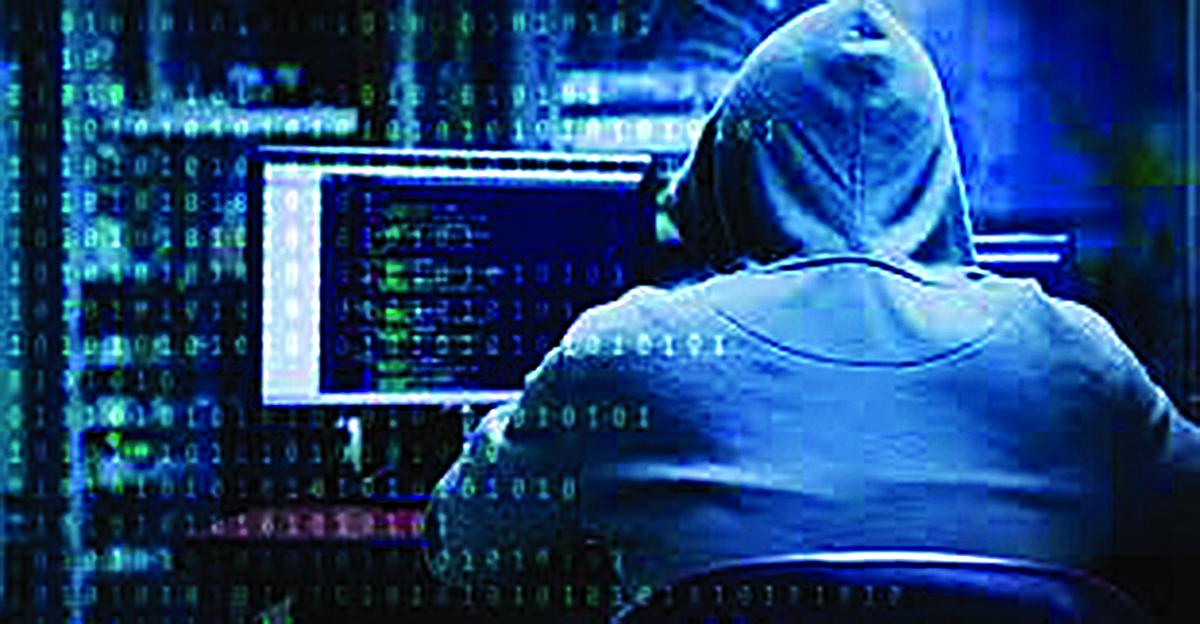
On July 18, India Cryptocurrency exchange WazirX has been hit by a cyber attack which resulted in the loss of over $230 million worth of digital assets from one of its wallets. The exchange responded by suspending regular trading and reporting the incident to Indian authorities and other cryptocurrency exchanges. The company also launched two reward programs for ethical hackers who can help the exchange trace, freeze, and recover stolen funds.
WazirX said there was a cyberattack on a multi-signature wallet operated through a digital asset custodian service known as Liminal. Multi-signature wallets have a built-in security feature that requires multiple parties to sign transactions.
“The impact of the cyberattack is over $230 million on our clients’ digital assets,” WazirX said in a blog post, adding that INR funds were not affected. The company has firmly denied that WazirX itself was hacked and has brushed aside rumors that it was tricked by a phishing attack.
The exchange also noted that it was “certain” that its hardware keys had not been compromised, adding that an external forensic team would be tasked with investigating the matter further.
But Liminal, after completing its investigation, said: “It is clear that the genesis of this hack stems from three devices compromised by WazirX.”
Meanwhile, WazirX founder and CEO Nischal Shetty said that the attack would have been possible only if there were four points of failure in the digital signature process.
Who is behind the cyber attack?
WazirX has not yet disclosed the suspected parties or perpetrators responsible for the hack. However, news reports have emerged that North Korean hackers were responsible for the incident.
On-chain analytics and other information indicate “that this attack was perpetrated by hackers affiliated with North Korea,” blockchain analytics platform Elliptic said.
In response to The Hindu’s questions to WazirX about the North Korean hackers, cryptocurrency exchange WazirX directed us to its blog and said it was working with law enforcement to investigate whether a known malicious group was behind the attack.
“This incident affected the Ethereum multisig wallet, which consists of ETH and ERC20 tokens. Other blockchain funds are not affected,” WazirX said in its official blog, specifying that approximately 45% (according to preliminary work) of cryptocurrencies were affected by the attack.
The company largely placed the blame on the process of securing Ethereum multisig wallets and said that the vulnerability was not unique to WazirX.
How important is WazirX in the cryptocurrency industry?
WazirX calls itself India’s largest cryptocurrency exchange by volume. As of June 10, it reported total holdings of ₹4,203.88 Crores, or 503.64 million USDT. Tether [USDT] It is a stablecoin, that is, a cryptocurrency pegged to the value of the US dollar, but it is not an official currency of the United States.
When The Hindu tried to access WazirX Public and Real-Time Reserve Proof After the hack, we were greeted with a notice that the page was under maintenance.
WazirX has received both positive and negative reviews in India. The Enforcement Directorate froze the exchange’s assets in 2022, criticizing its operating procedures and lax Know-Your-Customer (KYC) and Anti-Money Laundering (AML) regulations.
“By encouraging obscurity and adopting lax AML norms, it has actively assisted around 16 accused fintech companies in laundering proceeds of crime using the cryptocurrency route. Accordingly, equivalent movable assets amounting to Rs 64.67 Crore in possession of WazirX have been frozen under the PMLA, 2002,” the ED said in a statement.
What will happen to WazirX assets?
It is unlikely that the stolen WazirX assets will be fully recovered anytime soon. This is due to the very nature of cryptocurrency, where assets can be easily mixed, transferred, converted, and sent to anonymous wallets. The chances of asset recovery are even slimmer if it is confirmed that North Korean hackers are behind the incident.
CEO Shetty said on X on July 22 that “small” portions of the stolen funds had been frozen, but declined to provide further details. He added that the majority of the funds had not been moved from the attacker’s wallet.
In recent years, North Korean hackers have stolen billions of dollars in cryptocurrency, aiming to circumvent various financial and economic sanctions.
WazirX is currently working to resume normal operations and has planned to launch an online survey to decide how to resume trading on the platform.
While the Indian exchange has defended its security practices and highlighted the challenges facing the cryptocurrency industry as a whole, savvy crypto traders will be looking for action plans and accountability, rather than emotional reassurance.
What does your rewards program consist of?
WazirX has announced two bounty programs: one to gain more information about stolen funds, and the other to recover them. Both programs are open to everyone except WazirX employees and their immediate family members.
Under the first program, WaxirX will reward up to $10,000 to anyone who can provide the exchange with information that can help freeze the funds. If the bounty hunter is unable to freeze the funds on their own, they should work with WazirX by providing enough evidence to facilitate the process.
But “if the participant fails to freeze and/or does not cooperate with WazirX to facilitate the freezing of funds, then the participant will not be entitled to any rewards,” the exchange said.
The second program, called White Hat Recovery, is aimed at recovering funds. Participants are offered 10% of the amount recovered as a white hat incentive.
“This reward will be paid only after and subject to the successful receipt of the stolen amount by WazirX. The above rewards will be payable in USDT or in the form of recovered funds at the sole discretion of WazirX,” the exchange noted.
The bounty programs are expected to last for the next three months.
This is a Premium article available exclusively to our subscribers. Read over 250 premium articles each month You have exhausted your limit of free articles. Support quality journalism. You have exhausted your limit of free articles. Support quality journalism. X You have read {{data.cm.views}} of {{data.cm.maxViews}} free articles. X This is your last free article.
Tech
Trump Vows to Make US ‘Crypto Capital of the Planet and Bitcoin Superpower’
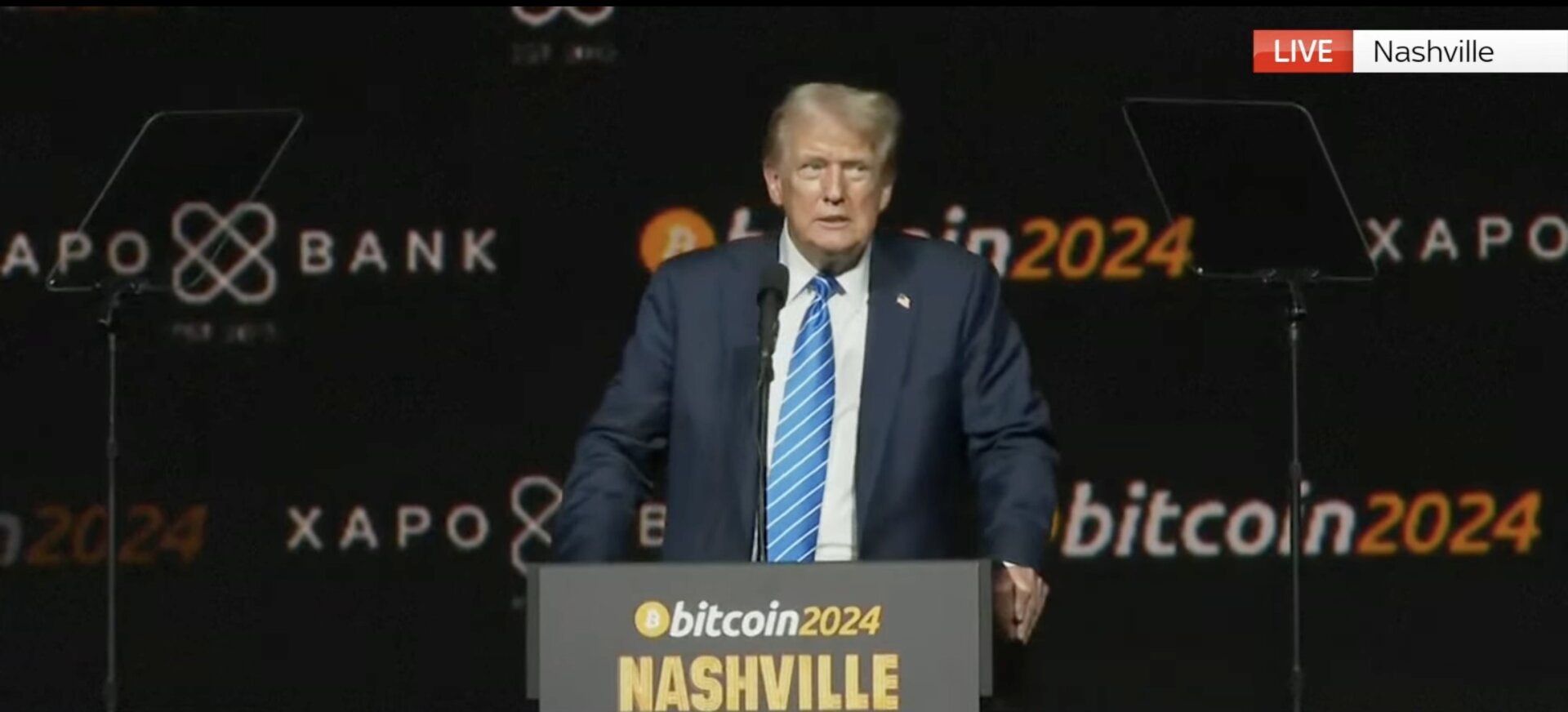
Speaking to a crowd of supporters at the Bitcoin 2024 Conference in Nashville, Tennessee, former President and Republican candidate Donald Trump said that if elected, he would make the United States the “crypto capital of the planet and a Bitcoin superpower.”
Trump added that he would “appoint a Presidential Advisory Council on Bitcoin and Cryptocurrencies,” which would have 100 days to “design transparent regulatory guidance that will benefit the entire industry.”
Trump has publicly opposed cryptocurrencies until recently. His latest statements serve as a rallying cry for a tech industry that has long called for more flexible regulatory oversight.
Shortly after taking the stage, Trump spent several minutes naming some of the conference attendees, at one point describing Winklevoss Twins Cameron and Tyler as “male role models with big, beautiful brains.” The former president has continued to speak out against electric car mandates and called for more fossil-fuel burning power plants.
Trump also said he would order the United States to withhold all Bitcoin it currently owns “in the future.” The U.S. government reportedly holds billions of dollars in Bitcoin.
About three years ago, Trump called Bitcoin “a fraud“that is “competing against the dollar.” In February 2024, the former president said that establishing a central bank digital currency would represent a “dangerous threat to freedom.” Yet, in May, Trump declared that he was “good with [crypto]“, adding, “if you’re pro-cryptocurrency you’d better vote for Trump.” That same month, he said he would commute with the Silk Road founder Ross Ulbricht’s Sentencingand his campaign said it would accept cryptocurrency donations.
Recent comments from Trump and independent presidential candidate Robert F. Kennedy Jr. have helped make cryptocurrency regulation a major political issue in the 2024 U.S. presidential election. This comes as the SEC intensifies its scrutiny of the cryptocurrency industry. SEC Chairman Gary Gensler, appointed by President Joe Biden, called the activity “full of fraud, scams, bankruptcies and money laundering.” Trump drew applause at the conference after promising to “fire” Gensler. (U.S. presidents have the power to appoint the heads of many federal commissions, including the SEC.)
With Biden out of the raceVice President Kamala Harris’s campaign advisers have He is said to have contacted to cryptocurrency leaders in an effort to “reset” relations with the industry. Harris’s campaign has not yet said whether her stance on the industry differs from Biden’s.
-
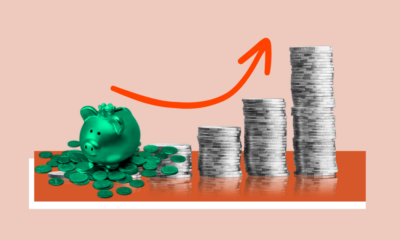
 Altcoins12 months ago
Altcoins12 months agoTop Solana-Based Altcoins Stack Up As Market Turns Bullish!
-

 Altcoins12 months ago
Altcoins12 months agoAltcoins Are Severely Undervalued, Awaiting Ethereum Move | Flash News Detail
-

 News12 months ago
News12 months agoAI meme Raboo and crypto newbie ZRO
-

 Altcoins12 months ago
Altcoins12 months agoAltcoins Correct Amid ETH Decline, Grayscale Outflows | Flash News Detail
-

 DeFi12 months ago
DeFi12 months agoIf You Missed BONK and PEPE This Year, This Viral New Crypto Might Be Your Salvation
-

 Tech12 months ago
Tech12 months agoLogan Paul Offers Partial Refund for Failed CryptoZoo Game
-
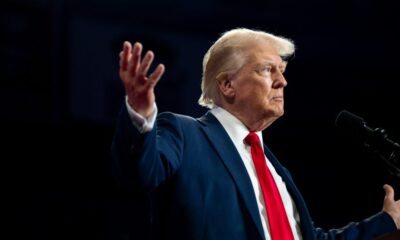
 News12 months ago
News12 months agoDonald Trump vows to make the US a ‘Bitcoin superpower’ and create a national stockpile of tokens
-

 DeFi12 months ago
DeFi12 months agoIf You Missed BONK and PEPE This Year, This Viral New Crypto Might Be Your Salvation
-

 Tech1 year ago
Tech1 year agoThe Latest Tech News in Crypto and Blockchain
-

 Altcoins12 months ago
Altcoins12 months agoAltcoins set to make new crypto millionaires during summer rally
-

 DeFi1 year ago
DeFi1 year ago🪂EigenLayer Airdrop Claims Go Live
-

 Videos1 year ago
Videos1 year agoLIVE FOMC 🚨 Could be CATASTROPHIC for Altcoins!






